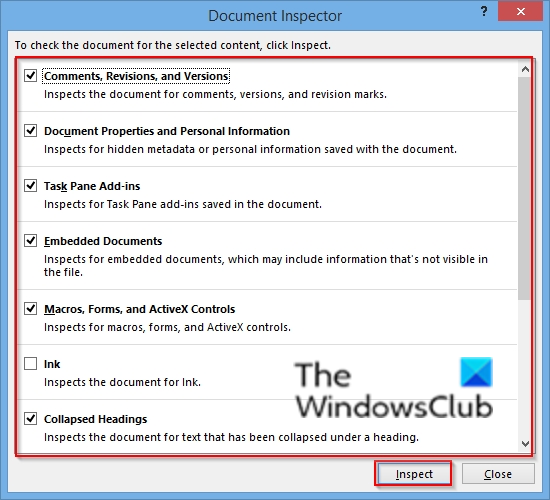

- WHERE IS THE DOCUMENT INSPECTOR IN WORD 2013 ZIP
- WHERE IS THE DOCUMENT INSPECTOR IN WORD 2013 DOWNLOAD
This is the relationship for the main document part and the Target URI will be “word/document.xml”. One (and only one) of these will be of type “…/officeDocument”. Notice that this is an XML file with a element containing a number of child elements. rels file in the _rels folder – this contains the top-level package relationships – and open the file. You should see something that looks like Figure 1.
WHERE IS THE DOCUMENT INSPECTOR IN WORD 2013 ZIP
zip and double click the file to open in Windows Explorer. View a more comprehensive list of Office Open XML extensions.Ĭhange the file extension of your new Word document to. Macros will not execute in documents without the “m” extension. “Macro enabled” Office Open XML File Format documents have an “m” (for macros) appended to the file extension. Open XML File Format documents have an x appended on the file extension. The first thing you’ll notice is the new file extension. Enter your name on the page, save the file to a convenient location and close Word.

WHERE IS THE DOCUMENT INSPECTOR IN WORD 2013 DOWNLOAD
If you have Word 2007 available (if you don’t, you can download a free trial), create a new blank Word document. Let’s try and make all this a little more concrete. NET Framework 3.0, System.IO.Packaging, designed to access, navigate and manipulate OPC files (and Office Open XML format files in particular). The XML parts themselves can be manipulated using familiar XML tools or APIs (such as the. The document container can be accessed using standard ZIP tools or APIs. Working with an Office Open XML format file is simplicity itself.

Thus content, resources and metadata exist as discrete, addressable document parts within a single container document. It is also possible to store your own custom XML parts (you don’t even have to specify a schema). a JPEG or WMA file) it doesn’t make sense to convert to XML, so these parts are stored in their native format.

Most parts are XML documents conforming to a specific reference schema. In this article we take a look at the fundamentals of the Open XML File Format and explore some key scenarios where building a solution around the new file format makes your life a breeze.Įvery Office Open XML format file is a collection of discrete document parts, connected via relationships and packaged together in a ZIP container as specified by the Open Packaging Conventions (OPC) described in Part 2 of the ECMA standard. This free download allows users of Microsoft Office 2000, Office XP, or Office 2003 to open, edit, and save files using the Open XML File Format. Do not fear though, backward compatibility is enabled through the “Microsoft Office Compatibility Pack for Word, Excel and PowerPoint 2007 File Formats”. The 2007 Microsoft Office system takes things a whole lot further XML is really at the heart of this release. Innovations in Office 2003 allowed you to save your documents as XML and even associate a custom XML schema with your document. In fact XML integration has been a feature of Office since Office XP. Office and XML are no strangers to each other. Welcome to the new world of Open XML and the opportunities it creates. Not only has the 2007 Microsoft Office system acquired a new user interface, its file format has also been given a makeover a new, XML-based format for Word, Excel and PowerPoint.


 0 kommentar(er)
0 kommentar(er)
